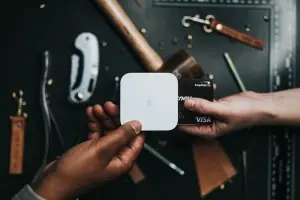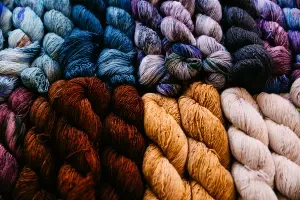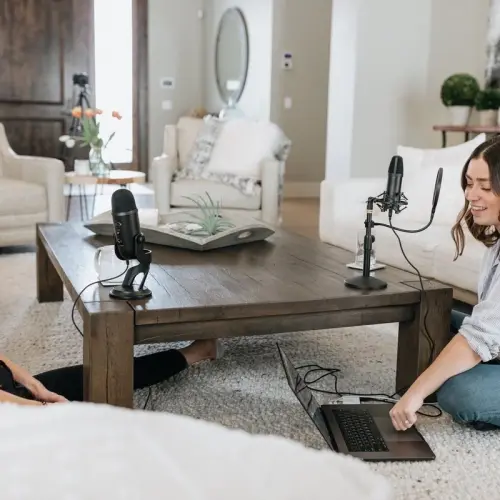Get access to exclusive updates, the latest news and the inside scoop 🍨

How To Monetize A Podcast
Let's get started on how to monetize a podcast with the following pointers.
Don't want to read the whole article? 😏Click here for chapters
- Discover How To Monetize A Podcast for Business 🎙️
- N0.1: How To Monetize A Podcast with Affiliate Marketing 🤑
- N0.2: How To Monetize A Podcast with Custom Merchandise
- N0.3: How To Monetize A Podcast with Tiered Patreon Memberships 🎤
- N0.4: How To Monetize A Podcast with Live Episodes and Tips
- N0.5: How To Monetize A Podcast with A Published Book 📚

Written by Madeleine
Discover How To Monetize A Podcast for Business 🎙️
Podcasting has grown in popularity over the last decade and with listeners being the fastest-growing media audience in 2022, there's plenty of room for new audience members to join the fold.
So, the popularity of podcasts isn’t questionable, but the possibility of monetization could be. As we’re sure many creators have wondered how to monetize podcast content whilst generating an engaged online audience.
Well, streaming platforms such as Spotify and Apple Podcasts do payout for streams. However, the payoff is usually relatively minimal.
Podcast sponsorships on the other hand are one option, but unless you're already a well-known figure, the chances of landing a high-paying sponsorship are minimal for new podcasts on the block.
Typically, traditional sponsorships tend to be out of reach for new podcasters since businesses are hesitant to risk investing in shows that have not accumulated a large following.
However, the real question is - is it possible for new podcasts to make money from their content? For those of you who are crossing your fingers right now, you can relax, as the answer is yes.
New podcasters can earn passive incomes that increase with their audience by putting up a few automated revenue streams, giving them time back to focus on podcasting.
So, without further delay, let's get started on how to monetize a podcast with the following pointers:
N0.1: How To Monetize A Podcast with Affiliate Marketing 🤑
Affiliate marketing is a performance-based marketing strategy in which a company rewards users who effectively refer clients to back their business. In nutshell, affiliate marketing is a fantastic way for any content provider to make money from their work.
Affiliate programmes pay money only after customers perform a pre-determined action. Even though most affiliate programmes will pay for purchases, others will pay out for; email signups, page clicks, downloads and/ or content engagement.
As a result, affiliate links are an ideal revenue option for up-and-coming podcasters as they pose a less financial risk to organisations.
Does Affiliate Marketing Work with Podcasts?
If you’re wondering how affiliate marketing works where podcasting is concerned, podcasters that become affiliates will receive a URL (referred to as an affiliate link) from the company they're working with. This link can then be shared with an audience.
Note:Note: Since podcasting is auditory, it’s a good idea to make your affiliate link easy to read, remember and re-type.
An excellent strategy is to have the URL simply be the company's website, plus your podcast name (e.g. affiliate.com/yourpodcastname). However affiliate links can also be included within; show notes, RSS feeds and emails sent to an email list.
With this link, businesses will be able to trace all targeted activity back to the podcast and pay creators in exchange for the number of clients sent their way.
Finding Affiliate Programmes for Podcasts
Not all podcasts will have the same audience, therefore the best affiliate programme for one may be significantly different for another. However, the idea is to team up with a company that shares the podcast's target audience.
For instance, if your podcast is about the latest gaming news, you should associate with companies that sell gaming-related products.
Note: Remember that podcasters can become an affiliate for numerous firms, so don't be afraid to try out a few and stick with the ones that are the most successful for your content.
The Best Affiliate Programmes for Podcasts
There are a lot of affiliate programmes out there, but to simplify your search, we'd recommend looking for affiliate programmes that cater to a wide range of audiences and marketing networks, as these solutions will connect consumers to several companies and opportunities.
Take a look at the list of affiliate programmes below to discover our top recommendations:
Shopify Affiliates: If the subject of your podcast is anything to do with entrepreneurship, starting a business, ecommerce, marketing, web design, social media, or the tech industry, then the Shopify affiliate programme would be a great fit for your content. It’s also worth mentioning that Shopify affiliates earn a 100% commission on the first two monthly payments of any subscription plan.
Amazon Associates: Amazon has one of the largest affiliate programmes in the world. With millions of unique products and retailers to choose from, it’s s easy to find products that are relevant to your audience.
Rakuten Advertising: Rakuten is another online marketplace with a large selection of businesses in its midst. Data-driven partnership recommendations, the option to design product showcases, access to training and instructional materials are just a few of the benefits of Rakuten's affiliate programme.
Skillshare Affiliates: Skillshare is an online learning community that offers thousands of courses and videos on a variety of topics for users to take advantage of. The Skillshare affiliate programme allows creators to send an audience to any online course, making it simple to pick one that’s specific to the target market at hand.
The Best Affiliate Marketing Networks for Podcasts
Creating an account with an affiliate network, choosing a brand to connect with and sharing a unique link is all it takes to start generating an income with affiliate marketing.
So, here are some of the best affiliate marketing networks to join:
Note: As each affiliate programme has its own set of advantages and disadvantages, the ideal podcast monetization plan is to diversify and experiment with various affiliate partners. So, don't be scared to remove underperforming affiliate links and replace them with high-performing affiliate connections if required.
N0.2: How To Monetize A Podcast with Custom Merchandise
If you’re wondering how to monetize a podcast with merchandise, podcasters often provide their fans with the opportunity to show their support by selling custom made products such as; t-shirts, stickers, posters, mugs, tote bags and journals.
Perhaps the easiest way to run a merch store is by using a print-on-demand distribution model? At the point of purchase, a third party will print and ship products on your behalf.
As a result, this means that there will be no; hidden costs, time lost on shipping, inventory to maintain and less financial risk.
It may take a little time to set up an online store and add products, but after you've done that, the rest of the process will be almost completely automated.
There are several print-on-demand tools and services that work seamlessly with Shopify. However, pricing and product selection can vary, so feel free to look around and find the service that best suits the needs of your podcast.
Need some help? Take a look at the list below for some of the best print-on-demand tools around:
This type of approach is ideal for podcasters since it allows content creators to run a completely automated merch store in the background while they concentrate solely on their podcast.
Totes and t-shirts, for example, can act as forms of promotion, helping to spread the word of a podcast offline.
If you decide to take this route, try to encourage your fans to submit photos of their newly purchased merch and utilise the items as rewards in giveaways and other contests to increase fan interaction between episodes.
N0.3: How To Monetize A Podcast with Tiered Patreon Memberships 🎤
Patreon is a popular way for content creators to monetize podcasts as it allows fans to make regular monthly contributions. Subscription options can be categorised into several tiers, with each tier having distinct perks.
Independent podcasters benefit from subscription-based revenue models as they allow creators to build a more consistent stream of income while focusing on growing a following.
While there are other crowdfunding sites that podcasters utilise to raise money from their listeners, they're usually designed to support one-time initiatives with specific funding objectives that are more difficult to connect with a podcast.
Nonetheless, creators can establish a source of recurring cash through Patreon's subscription-based payment system, which will help sustain their work and grow over time as the podcast's popularity grows.
N0.4: How To Monetize A Podcast with Live Episodes and Tips
As a podcaster, hosting a live in-person event can be a terrific way to supplement an income, but finding engagements can be difficult for new podcasts.
Live venues may allow creators to perform, but they are unlikely to compensate speakers unless their podcast is well-known and already generating a lot of revenue.
Furthermore, most venues are currently coping with COVID-19-related operational and capacity restrictions, making them less inclined to book live events or public speaking engagements.
However, what if you didn’t need a venue to host a live event and collect tips? What if you could host a podcast event, collect tips and expand the reach of your podcast, all without having to book with a venue?
Podcasters can use live streaming and tip collection systems to do so. It might be more beneficial for smaller podcasts to take this route, as virtual events have several advantages over live events:
Virtual events can be hosted by any podcast, regardless of how new it is or how large its audience is, as there is no need to reserve a place. Furthermore, as there are no venues to pay, all proceeds from the live podcast will be reinvested.
Fans from all around the world can discover and watch online shows, giving them a significantly larger audience than a show in one single city.
The; hosts, guests, writers, producers and editors of a podcast can work from any location in the world, saving money on travel expenses.
Podcasters can also go live online more frequently since creators will not need to reserve a venue or sell tickets. Creators might even consider hosting a weekly live event that is solely open to top-tier consumers.
Podcasters can also repurpose small clips from the show as social media material, bringing new listeners to the podcast.
Hosting A Live Podcast Online
To host a live event, you must first choose a platform to host it with. Most social media networks have a live option, so think about where you'd like to broadcast your podcast when deciding where to share it.
If you are looking for a few ideas of how to monetize podcast content and where episodes should be shared, take a look at the list below:
Patreon: Crowdcast is used by Patreon to conduct live video events, allowing creators to produce both free and patron-only live streams.
Twitch: Up to four creators can monetize and stream from the same window with Twitch's Squad Stream feature. Twitch is mostly used for gaming streams, so it's the perfect platform to use if your podcast is about gaming.
Facebook Live: Facebook has the largest audience of any social media platform. Although there is no paid stream option on Facebook Live, creators can monetise their video by activating in-stream adverts.
YouTube Live: Users can also monetize YouTube Live by enabling advertising and taking money from viewers via the Super Chat feature. To take advantage of these features, creators must first apply for and be accepted into YouTube's Partner Programme.
N0.5: How To Monetize A Podcast with A Published Book 📚
Like authors, podcast hosts are typically viewed as being a voice of authority on a particular subject, making the shift from podcast host to writer almost effortless. This does explain why so many popular podcasts have been turned into books by their producers.
Podcasters have a ton of advantages when it comes to selling books online, for instance:
No matter what topic your podcast covers, having a companion book will increase your credibility and give information more weight.
If you regularly podcast, you may have gotten an early start on writing the book without even realising it. Transcribed podcast information can serve as a decent preliminary outline for your work. If you're making a scripted podcast, you could simply make the scripts available to interested listeners.
Using different media to reach out to more people with increased visibility on literary blogs and markets will be sure to raise a podcast's prominence to reach a larger audience.
A book can be used as a sort of evergreen material, appealing to both new and old listeners. Books can be sold alongside other products, allowing every new podcast listener to become a prospective customer.
So, what are your thoughts on our tips for podcast monetization? Reach out and let us know if you’ve found this guide useful.
If you’re actively looking to work with a Shopify agency designer or developer to assist you with your business, we’d love to hear from you. Get in touch to get started!
Get Started with Shopify
Looking to get started with Shopify? Take advantage of Shopify's 14-day free trial, no credit card is required.
If you're actively looking to work with a Shopify agency designer or developer to assist you with your business, we'd love to hear from you. Get in touch to get started!
Want to read some more?
Have a look over more posts related to this one















